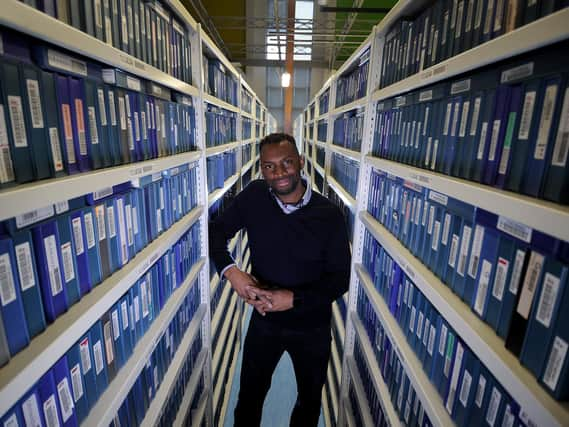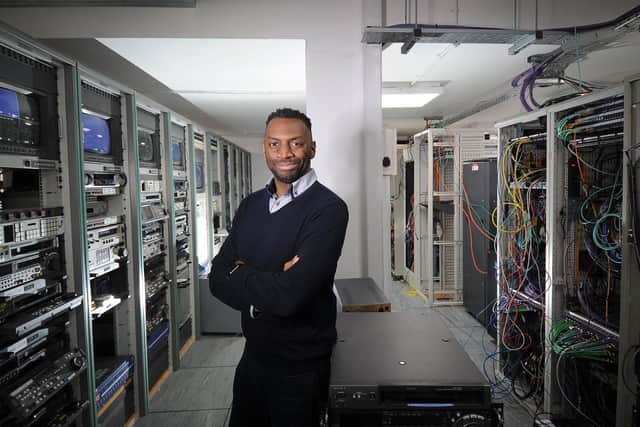How Sonny Hanley at ITV hopes to improve off-screen diversity


In 1988 a young nine-year-old was driven past the then YTV building in Leeds. The big yellow symbol caught his eye and when he asked his mother what that building was, she responded by saying “that’s where your TV programmes are made”.
From that moment onwards Sonny Hanley had made his mind up that not only was he going to work in television but also work for the established broadcaster ITV.
Advertisement
Hide AdAdvertisement
Hide Ad“I was obsessed with watching anything that was on TV,” Mr Hanley says. “The fact that there were only four channels back then, I can clearly remember watching programmes that probably were not aimed at my demographic but you watched what your parents watched.”


That obsession would ultimately lead Mr Hanley to the position of controller of content operations at ITV, based out of that very same building in Leeds.
It’s not all been straightforward for the self-confessed TV addict, who originally grew up in Harehills. Both his parents are originally from the Caribbean island of Saint Kitts.
“My mum made us see from an early age that education was important,” Mr Hanley says. “From an early age I knew that I would probably have to work twice as hard as somebody else who didn’t have the colour of my skin to get noticed.”
Advertisement
Hide AdAdvertisement
Hide AdEven after securing a position at ITV, Mr Hanley would find himself sliding down the career ladder during the recession.


However, the one thing that has always been steadfast is his love of television and in particular working for ITV.
During his 11th birthday, Mr Hanley’s mum splurged out on a camcorder for him.
“By anyone’s standards an extravagant gift for an 11-year-old especially back then because they cost a fortune,” Mr Hanley said. “I guess that’s the belief she had in me.”
Advertisement
Hide AdAdvertisement
Hide AdMr Hanley still has some of the films that he would make with his friends in the neighbourhood.


After attending Leeds College of Technology, he went on to study media, film and television production at university in Buckinghamshire.
In 2001, he got his first job in TV as a runner on a small drama production in Leeds.
“That’s the lowest rung on the TV ladder,” Mr Hanley says. “That’s making the coffee, doing the photocopying, picking the actors up and that sort of stuff.”
Advertisement
Hide AdAdvertisement
Hide AdLuckily, though, this production company shared a building with Screen Yorkshire, which was running a new entrants’ training scheme for people wanting to break into the media.
Mr Hanley applied and was one of just five applicants to be chosen for the programme that would provide each of them with experience through five different placements.
“That was a real proud moment because I knew how sought after that course was,” Mr Hanley says.
He added: “When they told me of the five placements, I said ‘can I make ITV the last placement?’
Advertisement
Hide AdAdvertisement
Hide Ad“My plan was that I’d get in, I would do the three-month placement there, they would think I was so good and then they would just give me a job.”
While the first part of the plan worked out there were no jobs going at the broadcaster so he ended up taking a production coordinator role at another company.
Then nine months later he got a call from ITV asking if he’d like to join on a three-month contract. That three months would turn into nearly two decades and counting.
He did however have an five-month break when he was made redundant during the recession in 2008.
Advertisement
Hide AdAdvertisement
Hide AdIt was the most challenging time in his career but did provide him with the opportunity to reevaluate what he wanted to do.
Mr Hanley said: “I felt like I’d had enough of making TV programmes, in a sense, so maybe it came at a good time.
“I knew I wanted to stay in TV but I knew I didn’t want to make TV programmes anymore. I came back to ITV, five months after I was made redundant, in an operational role.”
That presented its own challenge to Mr Hanley. He was back in an entry level job as a content workflow coordinator.
Advertisement
Hide AdAdvertisement
Hide AdMr Hanley remembers moments where he would bump into colleagues that he previously worked with.
While they may not have said so to his face, Mr Hanley got a sense that they felt embarrassed for him.
“But that only spurs you on to prove yourself again,” says Mr Hanley. “Working hard. Making bosses see that you can take on more work.” Mr Hanley would eventually work his way up to his current role.
Mr Hanley became less aware of his ethnicity as he got older. His progress though has not blinded him to the fact that a lack of diversity is still an issue behind the screens in the broadcast industry.
Advertisement
Hide AdAdvertisement
Hide AdWhile ITV is trying to do its bit, it has the ITV Embrace network, which looks to increase diversity at the business, Mr Hanley still feels more can be done to encourage people from Black Asian and Minority Ethnic (BAME) backgrounds into the industry.
He wants the ITV board to continue backing initiatives to improve diversity and is in the process of reaching out to Leeds schools to ensure he does his bit.
Mr Hanley said: “Now that I hire people, we get maybe 30 to 40 CVs per job that we advertise and the majority of them are from young white males. It says to me that this industry is not appealing to a diverse group of people. For specific technical jobs that I hire for, we almost get no females.”
He added: “The responsibility is on my shoulders as well as anybody else from a BAME background to look and think about what more we could be doing.
Advertisement
Hide AdAdvertisement
Hide Ad“I’m wanting to go into schools and talk to kids from BAME backgrounds to say ‘Does a career in the media interest you? Why doesn’t it?’”
His advice to people from BAME backgrounds pursuing a career in television is simple.
“The advice that I give anybody, but specifically people from the BAME background, is work hard and be nice to people,” Mr Hanley says.
Mr Hanley is today responsible for getting hit shows such as Love Island onto phones, iPads and laptops in time for when they finish transmission on TV.
Advertisement
Hide AdAdvertisement
Hide AdDespite his success, Mr Hanley doesn’t believe in putting targets on himself as he feels they ultimately lead to disappointment.
Whatever the future may hold for him, one thing is for sure and that is that the magic of TV remains undiminished.
“For my work to be seen and consumed by millions of people every night makes me very proud,” he says.
Curriculum vitae
Title: Controller of content operations at ITV
Lives: Horsforth
Favourite holiday destination: Ibiza
Last book read: The Edge: What Business can Learn from Football
Favourite film: Friday
Favourite song: Candy by Cameo
Car driven: Range Rover Sport
Most proud of: My three beautiful children
Education: Degree in media and television production
Comment Guidelines
National World encourages reader discussion on our stories. User feedback, insights and back-and-forth exchanges add a rich layer of context to reporting. Please review our Community Guidelines before commenting.